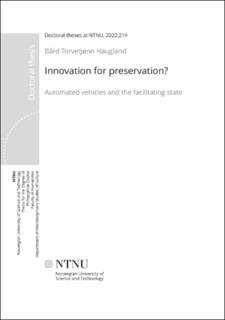| dc.contributor.advisor | Skjølsvold, Tomas Moe | |
| dc.contributor.advisor | Ryghaug, Marianne | |
| dc.contributor.author | Haugland, Bård Torvetjønn | |
| dc.date.accessioned | 2022-07-12T09:20:33Z | |
| dc.date.available | 2022-07-12T09:20:33Z | |
| dc.date.issued | 2022 | |
| dc.identifier.isbn | 978-82-326-6319-4 | |
| dc.identifier.issn | 2703-8084 | |
| dc.identifier.uri | https://hdl.handle.net/11250/3004633 | |
| dc.description.abstract | Norsk samandrag
I 2017 etablerte den norske regjeringa Lov om utprøving av selvkjørende kjøretøy, ei lov som gjorde det mogleg å prøve ut automatiserte køyretøy på norske vegar. Denne lova var motivert av påstandar om at automatiserte køyretøy kan gjere vegtransporten grønare, sikrare og meir effektiv, samt påstandar om at utvikling og bruk av slike køyretøy vil leggje til rette for både industriutvikling og økonomisk vekst. Denne avhandlinga undersøkjer innovasjonsprosessar knytt til automatiserte køyretøy for å betre forstå kva funksjon ein ser føre seg at nye transportteknologiar skal fylle, både innanfor transportsektoren og i samfunnet elles.
Avhandlinga består av tre artiklar og eit essay som analyserer funn på tvers av artiklane. Den fyrste artikkelen viser korleis generelle forventningar knytt til automatiserte køyretøy blir omsett til meir spesifikke forventningar om korleis slike køyretøy kan vere nyttige i ein norsk samanheng. Vidare viser artikkelen korleis desse forventningane også er knytt til større forventningar om korleis framtida kan og bør sjå ut, og korleis ein ser føre seg at automatiserte køyretøy kan vere med på å gjere denne framtida mogleg. Den andre artikkelen viser kva forventningar til automatiserte køyretøy som kjem til uttrykk i høyringssvar knytt til Lov om utprøving av selvkjørende kjøretøy. Artikkelen viser også korleis desse forventningane kjem til uttrykk i spesifikke innovasjonspraksisar og korleis desse praksisane er med på å skape nye forventningar til både teknologi og tilhøyrande politikk. Den tredje artikkelen fokuserer på dei tidsmessige aspekta ved innovasjon. Spesifikt samanliknar den politisk nyskaping med teknologisk nyskaping for å forstå implikasjonane av dei to tilnærmingane når det kjem til å forme framtidas transportsystem.
Kryssanalysen stiller spørjeteikn ved den transformative rolla som ny transportteknologi gjerne blir tilskrive. Sjølv om ein ikkje bør avslå nytten av teknologiske nyskapingar innanfor transport bør ein likevel forstå kva forventningar som er knytt til slike nyskapingar. I Noreg er transportnyskaping i stor grad retta mot å bevare og vidareføre etablerte transportpraksisar, og med det også ei spesifikk samfunnsorganisering. Forventninga om at morgondagens transportteknologi kan redusere eller til og med løyse dagens transportproblem unyttiggjer tiltak utover dei som er naudsynte for å leggje til rette for teknologisk nyskaping. Forventningar knytt til ny teknologi gjer det dermed mogleg å utsetje tilgjengelege, men potensielt upopulære tiltak på ubestemt tid. Dette er ei utfordring, ettersom både teknologiutvikling og dei tilhøyrande forventningane er kjenneteikna ved stor usikkerheit. Derfor er det ikkje tilstrekkeleg å gjere ei kritisk vurdering av nye transportteknologiar og dei tilhøyrande forventningane: på grunn av nemnte usikkerheit bør ein også sikte mot ei transportframtid som ikkje er avhengig av framtidig teknologisk nyskaping for å bli verkeleggjort. | en_US |
| dc.description.abstract | English summary
In 2017, the Norwegian Government flagged its interest in automated vehicles, and established legislation that allowed for automated vehicles to be tested on public roads. Proponents of automated vehicles claim that such vehicles represent an opportunity for making road transport greener, safer, and more efficient, as well as a considerable opportunity for industrial development and economic growth. This thesis takes innovation processes relating to automated vehicles as a starting point for understanding the roles ascribed to new technologies in and beyond the transport sector.
The thesis is composed of three articles and an overarching essay. The first article concerns the translation of a set of generalised expectations into a more specific vision of how the development of automated vehicles might benefit the Norwegian state, and, by extension, what future automated vehicles might render possible. The second article concerns public expectations regarding automated vehicles in Norway as expressed through a public hearing, how these expectations are reflected in innovation practices, and how the practices shape further expectations. The third article focuses on the temporal aspect of innovation, and contrasts technology innovation with policy innovation in order to draw out the implications of the two approaches to shaping the future of transport.
The overarching essay analyses, synthesises, and draws conclusions from across the three articles to enable a discussion of the transformative role often ascribed to technology. Whereas the importance of technology should not be discounted offhand, transport innovation in Norway is configured in a way that ultimately promotes the continuation and preservation of established transport patterns in particular, as well as society more generally. The expectation that future technology will help ameliorate or even solve the problems associated with today’s transport system allows present-day action to be deferred indefinitely. However, expectations are always associated with considerable uncertainty. Hence, it is crucial not only to ask what benefits new technologies might bring, and to assess any such claims critically, but also to plan for a future in which expectations for new technologies might not be realised. | en_US |
| dc.language.iso | eng | en_US |
| dc.publisher | NTNU | en_US |
| dc.relation.ispartofseries | Doctoral theses at NTNU;2022:219 | |
| dc.relation.haspart | Paper 1: Haugland, Bård Torvetjønn. Changing oil: self-driving vehicles and the Norwegian state. Humanities & Social Sciences Communications 2020 ;Volum 7. | en_US |
| dc.relation.haspart | Paper 2: Haugland, Bård Torvetjønn; Skjølsvold, Tomas Moe. Promise of the obsolete: expectations for and experiments with self-driving vehicles in Norway. Sustainability: Science, Practice, & Policy 2020 ;Volum 16.(1) s. 37-47 | en_US |
| dc.relation.haspart | Paper 3: Haugland, Bård Torvetjønn. A new system in the shell of the old: prefiguration in technology and policy experimentation. This paper is submitted for publication and is therefore not included. | en_US |
| dc.title | Innovation for preservation? Automated vehicles and the facilitating state | en_US |
| dc.type | Doctoral thesis | en_US |
| dc.subject.nsi | VDP::Humaniora: 000::Kulturvitenskap: 060 | en_US |

